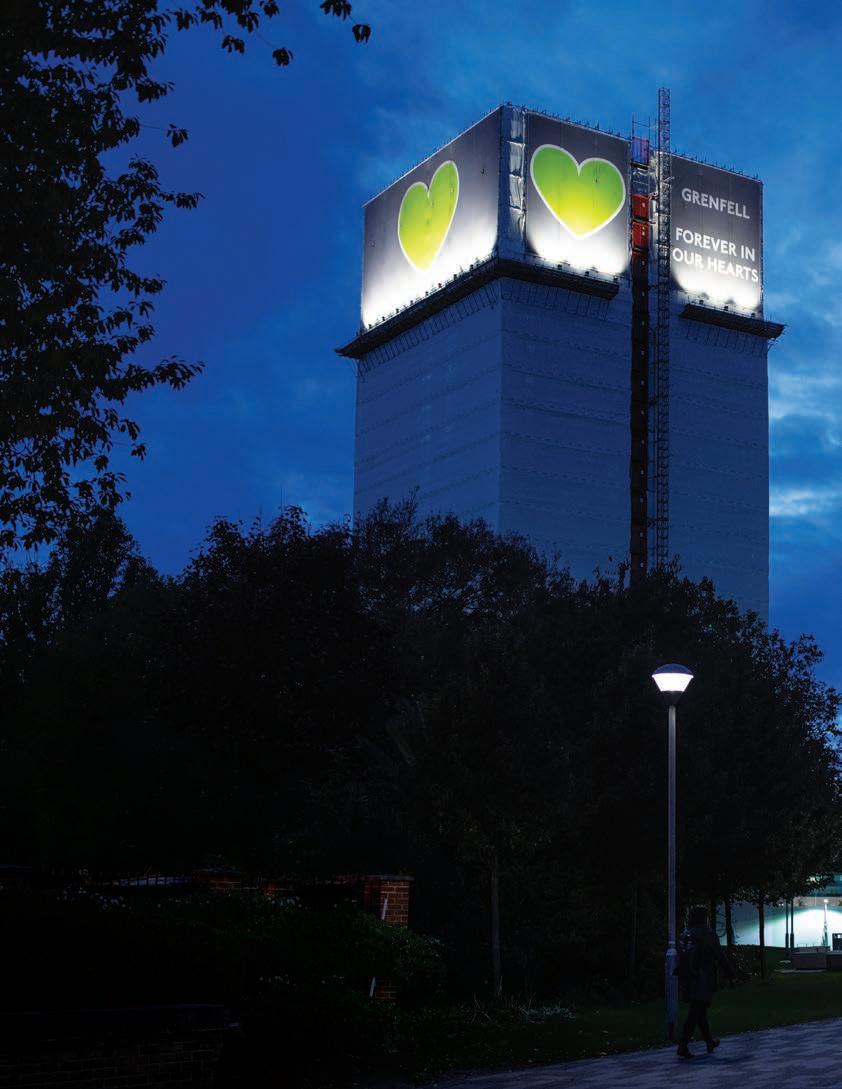
18 minute read
BIG PICTURE
Forever in our hearts
PHOTOGRAPHY: GETTY A s the second stage of the public inquiry gets underway in the UK, and as we approach the third anniversary of the tragic events of 14 June 2017, the charred remains of Grenfell Tower are still covered in white sheeting, emblazoned with the poignant message, ‘Forever in our hearts’.
The inquiry is now looking at why the London tower block was wrapped in fl ammable cladding during its refurbishment between 2012 and 2016. In her opening address to phase two, Stephanie Barwise QC, representing survivors and the families of those who died, said there were ‘epidemic levels of incompetence’ over fire safety at Grenfell and accused the architects, building contractors, suppliers of cladding and insulation material, and the Kensington & Chelsea Tenant Management Organisation of ‘indulging in a blame game’ to avoid criminal or civil responsibility.
Those involved recently asked the inquiry for key witnesses to be given assurances that their evidence would not be used against them in any criminal proceedings. Recently appointed attorney general Suella Braverman said she had concluded the guarantee was needed to ‘enable the inquiry to continue to hear vital evidence about the circumstances and causes of the fi re’. Without it, some witnesses would be likely to decline to give evidence, her offi ce added, by claiming the legal right of privilege against self-incrimination.
The immunity for testimony would not apply to evidence already given to the inquiry, which could still be used in a criminal investigation into the tragedy that claimed 72 lives. The Metropolitan Police is investigating a wide range of possible offences related to the blaze, including corporate manslaughter.

STEPHANIE BARWISE QC
THE UK’S FLAGSHIP EVENT FOR HEALTH & SAFETY
450+ 3fVWPWb]`a
16,000+ Attendees



CPD Accredited Content
REGISTER FOR YOUR FREE TICKET
OFFICIAL MEDIA PARTNER:
WWW.HEALTHANDSAFETYEVENT.COM
FOUR EVENTS, ONE PASS
THE UK’S FLAGSHIP EVENT FOR HEALTH AND SAFETY RETURNS TO THE NEC BIRMINGHAM
On 28 to 30 April, The Health and Safety Event will return to the NEC Birmingham. It is the annual meeting point for health and safety professionals to share insights and discover the newest solutions to help them achieve their goals in creating a safer workplace.
With a focus on promoting and improving health and safety standards, education will be at the heart of the event. With four theatres delivering expert-led, CPD-accredited content, the agenda will be packed with practical guidance, support and advice so delegates can come away with the tools they need to implement in their own workplace.
Accredited education programme The British Safety Council Conference will be opened by new HSE chief executive Sarah Albon. Her keynote will outline the regulator’s role in ensuring senior management

leadership on health and safety, as well as HSE regulators’ future focus and strategy. Sarah will also fi nish her keynote session to observe a minute’s silence at 11am to commemorate Workers’ Memorial Day. Held on 28 April every year and offi cially recognised by the UK government, we will remember those who were killed and injured at work. The Knowledge Exchange, sponsored by Southalls, will feature a panel of industry experts to cover topical issues and challenges facing HS professionals today. Sessions include promoting health and wellbeing, working from height, mitigating the risk of mental ill health, the health implications of asbestos and hearing protections – to mention just a few. Working in partnership with Lone Worker Safety Live, the Lone Worker Theatre will be hosted by Nicole Vazquez and will address the key issues of safety, security and wellbeing. Learn about the challenges faced by lone workers and come away with practical strategies on assessing and managing the risks. New and re-edited, the Safer Logistics and Machinery Safety Theatre will offer expert advice and guidance on this vitally important area. The content programme will tackle the key safety hot spots in the world of warehousing, logistics and machinery.
New for 2020 The Machinery Safety Zone, supported by Premier Partners Pilz UK, Machine Safety and Turck Banner, is new for 2020. It will showcase the latest technologies and solutions around this vitally important area and offer specially curated CPD-accredited content.
Another new feature is the Professional Development and Career Zone sponsored by HSE Recruitment Network, whose consultants will offer expert industry advice. Their knowledge extends beyond the identifi cation, attraction and assessment of HSE talent to genuine subject-matter expertise.
The British Safety Industry Federation will also be hosting a networking lounge that offers the opportunity to learn about procuring personal protective equipment from reputable registered safety suppliers and see demonstrations of quality control and testing. Exhibitors already confi rmed include Access, Beeswift, Diadora, DuPont, Ergomat, Evaccess, Specsavers, Southalls, Toyota Material Handling, Polyco Healthline, Uvex and more.
A must-attend The Health and Safety Event is the most interactive and informative exhibition in the UK and a must-attend for anyone with responsibility for protecting people or premises. Co-located with The Fire Safety Event, The Facilities Event and The Security Event, it will boast 450+ exhibitors and 16,000+ attendees, it the most comprehensive offering dedicated to improving the safety and security of people, property and assets.
For more information, visit the website at healthandsafetyevent.com
COVER STORY BLOCKING OUT C OVER STO RY 40 M I N S W O R D S B E C K Y A L L E N Among the long and neglected to-do list of UK policy, six areas in OSH are in need of urgent attention and legislation. This is our manifesto for systemic and lasting change.





NOISE THE A s the UK Conservative government begins work on a fresh legislative agenda, IOSH is urging the new administration to turn its attention to workplace health and safety.
IOSH wants to see rapid progress in six key areas of OSH, from mental health and healthbased modifi cations at work to the gig economy and post-Grenfell building regulation (see the full list, right).
Brexit has been a sticking point, draining much attention from UK domestic policy (see What’s the impact of Brexit?, overleaf). ‘These are all areas that have been neglected for far too long,’ says Richard Jones, IOSH head of policy and regulatory engagement. The neglect is amplifi ed by rapid economic and demographic changes in the UK’s workforce. An ageing population, technological change and more insecure gig working plus larger numbers of small- and medium-sized enterprises (SMEs) and self-employed all contribute to the pressing need for better workplace health management. IOSH has prioritised the six areas for several reasons. They refl ect IOSH’s six global priorities: fatal injuries, occupational cancer, wellbeing, rehabilitation, musculoskeletal disorders, and sustainability and human capital. They also align with the IOSH manifesto, making the case for health and safety, occupational health (OH), designing-in safety and health, developing competent workforces and championing social responsibility. Crucially, the six areas are also rooted in ongoing discussions between H wa progress in om mental health ased modifications at w economy and post-Grenf regulation (see the full lis Brexit has been a stick draining much attention domestic policy (see Wh ofBrexit?, overleaf). ‘Th that have been neglected says Richard Jones, IOS and regulatory engagem Conservative nt begins work on islative agenda, rging the new ation to turn its o workplace safety The neglect is amp economic and demogra in the UK’s workforce. A population, technologi more insecure gi numbers ent s the UK C governmen a fresh legi IOSH is ur administra attention to health and IOSH w prog OSH, from based IOSH’S SIX AREAS FOR URGENT PROGRESS IN THE UK 1 Occupational health service reforms and subsidies 2 The right to request health-based modifi cations at work 3 Mental health at work improvements 4 Modern working practices reform 5 Better transparency on preventing modern slavery in supply chains (see article on page 12) 6 National ‘postGrenfell’ reforms on building regulation and fi re safety.



government and the OSH community. ‘These are all areas that government has already consulted on or reviewed, or were in the Conservative manifesto,’ Richard explains. ‘We want to make sure that the UK government follows through on improvement work already begun or committed to. That’s why we are highlighting them – and will keep highlighting them.’ 1 OCCUPATIONAL HEALTH REFORMS During 2019 in the UK, there were 1.4 million cases of work-related ill health, 600,000 cases of work-related stress, anxiety and depression, 500,000 cases of musculoskeletal disorders, and 13,000 deaths caused by past workplace exposures to chemicals or dust. The economic impact is massive too: 23.5 million working days were lost to work-related ill health and an annual cost to the UK economy of £22bn.
Driving down this ill health depends on universal access to high-quality OH services, yet access remains the preserve of too few. ‘Access to OH services is very patchy,’ says Richard. ‘In the private sector, only 39% of workers have access. Research shows that the UK is short of more than 40,000 OH professionals, a major shortfall that we must address.’
SMEs and the self-employed face particular challenges, with small fi rms fi ve times less likely to invest in OH services than larger fi rms. The government’s 2019 consultation on reducing health-related job loss, Health is everyone’s business, acknowledged that OH advice is effective in supporting a return to work, but that cost can be a barrier for SMEs.
It’s an issue that IOSH has raised with the UK government, both in its response to the consultation and in its current call to improve




access to OH services. According to Richard: ‘IOSH commissioned a survey of SMEs in 2012, and 40% told us that tax breaks would help them do more on OH. That’s why we’re asking the government to introduce economic incentives like tax breaks and vouchers or subsidies to help SMEs and the self-employed access high-quality OH services.’
Increasing demand, however, must go hand-inhand with boosting capacity. The General Medical Council reports that the number of specialist OH physicians declined by 20% between 2012 and 2018. The Faculty of Occupational Medicine (FOM) says: ‘Funding models for training and developing the OH workforce – physicians, nurses and allied health professionals – should be designed to meet population health needs, as is the case with other health specialities.’
The FOM is also concerned about low levels of provision in SMEs, but views innovative delivery models, such as access to OH advice via the NHS, as the best remedy: ‘Subsidies to employers or individuals may have a place but should be linked to access to competent, quality-assured OH advice and prioritisation of access to NHS interventions,’ it says. 2 RIGHT TO REQUEST HEALTH-BASED MODIFICATIONS In tandem with OH market reform, the UK government consultation Health is everyone’s business discussed the need for a clear legal framework for employers, mooting the possibility of introducing a legal right to request workplace modifications for people not covered by the Equality Act 2010. IOSH is calling on the UK government to introduce a right to request health-based


WHAT’S THE IMPACT OF BREXIT?
‘Brexit is a long-term strategic project; the act of leaving is only the start,’ says Richard Jones. ‘It must now run in parallel with domestic priorities. The UK’s domestic situation – which includes many pressing workplace issues – can’t continue to be put on hold. Failure to prioritise a safe and healthy workforce would be a mistake in our view. It’s short-sighted, counterproductive and a false economy.’
Sajid Javid, the former chancellor, poured cold water on expectations of a level OSH playing fi eld in January: ‘There will not be alignment, we will not be a ruletaker, we will not be in the single market and we will not be in the customs union – and we will do this by the end of the year.’ But the EU has said one of its priorities in negotiation is to prevent the UK from easy access to the single market without maintaining similar labour and environmental standards. It is unlikely non-alignment will occur for its own sake, so the scope for reducing any health and safety protection is narrow, but the Brexit process has been unpredictable and that shows no signs of changing.
modifications, which would, for example, give women going through the menopause the right to ask for a desk nearer a window or have a fan nearby, allow flexible working or a change in tasks. ‘It’s about recognising the need for workplaces to be more worker-friendly and accommodate individual needs more,’ says Richard. 3 MENTAL HEALTH AT WORK In 2017, Thriving at work – the independent review on improving mental health and supporting workers with mental health problems to remain in work – found that 300,000 people in the UK with long-term mental health conditions fall out of work each year, and that poor mental health costs employers up to £42bn a year, with an annual cost to the UK economy of up to £99bn. Thriving at work concluded that, with the right support and adjustments, many people with mental health conditions could remain in work. It set out a framework to enable all UK employers to address workplace mental health. And it called on the UK Health and Safety Executive (HSE) to do more on mental health during inspections, revise its guidance on the duty to manage work-related mental ill health, and widen its management standards for stress.
The 2019 Conservative manifesto reiterated the party’s commitment to parity of treatment between mental and physical health and promised legislation to ensure that patients with mental health conditions have greater control over treatment. But despite increasing public discussion around mental health – from campaigns such as Time to Change and Heads Together to awareness programmes such as Every Mind Matters and Mates in Mind – IOSH wants to see more education about the nature of ‘good work’ and its importance in supporting mental health so that employers can do more to create healthier workplaces. IOSH is also concerned about rising levels of workplace stress. ‘Last year, Britain had over 600,000 cases of work-related stress. That’s the largest number for 18 years. It’s worrying,’ says Richard. ‘We would like to see fi nancial incentives for SMEs to better support mental health at work, and we would also like the government to support the “right to disconnect”.’
Workers at French fi rms with more than 50 staff have had a legal right to disconnect since 2017, and Italy




followed suit in 2019. Companies such as Orange, VW and Axa have introduced similar policies. ‘Digitalisation has created an “always-on” culture,’ says Richard. ‘We want the government to consider a right to switch off to prevent this intrusion.’ 4 MODERN WORKING PRACTICES REFORM As well as being good for mental health, a right to switch off and greater focus on what makes work good are also central to modern working practices and the gig economy. With more than three million people in the UK facing insecurity at work and 1.4 million contracts lacking a guaranteed minimum number of hours’ work, many modern working practices can adversely affect safety and health.
In 2017, the government-commissioned Taylor review of modern working practices found that despite record levels of employment in the UK, the quantity of work needed to be matched by its quality. The report, Good work, called on government to ‘adopt the ambition that all work should be fair and decent’ – a view echoed by IOSH.
‘The report found problems with one-sided fl exibility and insecurity in the growing gig economy. The government is committed to taking action on this and has already legislated in some areas, like protecting agency workers and extending the right to a written statement for all workers, but IOSH is keen to see further progress,’ says Richard. ‘The upcoming Employment Bill needs to include a right for all workers to request a more predictable contract and make fl exible working the default unless employers have a good reason not to.’
As well as taking forward recommendations of the Good work plan, the report’s author and chief executive


IOSH IS CAL L ING FOR A BAN ON COMBUSTIBLE CLAD D ING ON AL L HIGH-RISE BUILDINGS, MORE A C TION ON SPRINKLERS, AND THE HACKIT T REVIEW’S SAFETY CASE REGIME


of the RSA Matthew Taylor wants to see progress made towards an integrated single enforcement body. Matthew says: ‘Economic successes must be enjoyed by all workers – should the labour market not deliver good work, then we stand little chance of boosting our national productivity in the long run.
‘The government should focus on creating the conditions for good work for all. Those in lowskilled jobs ought to have greater control over their working hours, an awareness of their rights, a sense of progression and lifelong learning. Good work will restore the link between hard work and fair pay.’ 5 PREVENTING MODERN SLAVERY Few people will forget the 39 bodies of Vietnamese nationals found in a container lorry in Essex last year. For professionals, the changes required to prevent a similar incident are happening too slowly.
The Home Offi ce estimates around 13,000 people in the UK are victims of modern slavery, and while the Modern Slavery Act 2015 was world-leading when it was introduced, the crucial clause on transparency in supply chains (TISC) is failing to work as intended.
‘Forty per cent of organisations are failing to comply with TISC, and of those that do disclose, the statements are often of poor quality,’ Richard explains. ‘We want to see a central, government-run repository of statements, standard core content requirements for disclosures; we want TISC extended to the public sector and organisations with a turnover below £36m; and we want the government to remove the ability of organisations to say they are taking no steps to tackle modern slavery – we think that’s wrong.
‘Everyone should be acting to eradicate modern slavery, and it’s only through transparency that stakeholders can hold organisations to account for the actions they take to tackle it.’ Read more about slavery and supply chains in our news analysis on page 12.


6BUILDING REGULATION AND FIRE SAFETY REFORM Another graphic illustration of health and safety failings was the 2017 Grenfell Tower fi re in London, which killed 72 people. Here too, progress has been painfully slow. Dame Judith Hackitt’s review of building regulations and fi re safety revealed extensive problems and a system not fi t for purpose. The government accepted the recommendations in full, as well as those from the fi rst phase of the public inquiry by Sir Martin Moore-Bick. It plans to set up a new building safety regulator within the HSE. But it has also threatened to name and shame organisations that don’t improve their buildings.
IOSH is calling for a ban on combustible cladding on all high-rise buildings – both residential and non-residential – more action on sprinklers, the introduction of building and fi re safety competence requirements and the safety case regime recommended by the Hackitt review, and clarifi cation of the regulatory reform fi re safety order to ensure everyone understands that it now applies to external walls, cladding and fi re doors in residential premises.


IN CONCLUSION There is much at stake: changes will reduce harm signifi cantly. ‘Realistically,’ says Richard, ‘IOSH expects all six to be delivered in this parliament. The Queen’s speech included bills on employment, building safety and fi re safety. These can set the UK legislative framework for much of what IOSH wants done, so there should be nothing stopping them.’
Collaborate
SUPPORTING A SHARED VISION OF A SAFE AND HEALTHY WORLD OF WORK
IN THIS SECTION
Climbing the career ladder and the challenges ahead from fi ve of the OSH profession’s female leaders P34 | Dr Christa Sedlatschek refl ects on EU-OSHA’s collaborative work P38 | What are the dangers for under-18s of trespassing on the railway? P40 | Fighting fatigue feedback and the latest ‘must-read’ P44 | Workwear predictions from industry providers P47
ON THE RIGHT TRACK CASE STUDY

P40











